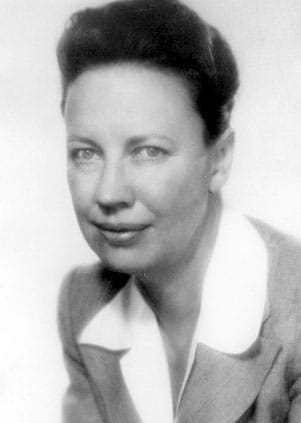 Dorothy Swaine Thomas was a new breed of female academic when she began her career in the mid-1920s: instead of floor length dresses and tightly-wrapped hair, she wore a bob, tailored clothing, and held a cigarette in a long holder. Unlike many educated women of the prewar generation, she worked side-by-side with male colleagues. Thomas, Wharton’s first female professor, was the most successful woman sociologist of her generation. She co-directed the Study of Population Redistribution and Economic
Dorothy Swaine Thomas was a new breed of female academic when she began her career in the mid-1920s: instead of floor length dresses and tightly-wrapped hair, she wore a bob, tailored clothing, and held a cigarette in a long holder. Unlike many educated women of the prewar generation, she worked side-by-side with male colleagues. Thomas, Wharton’s first female professor, was the most successful woman sociologist of her generation. She co-directed the Study of Population Redistribution and Economic
Growth, a key research report that assisted Wharton demographers in creating basic statistical descriptions of American population movements. The study, which Thomas co-authored with future Nobel Prize winner and faculty member Simon Kuznets, broke new ground, revealing the tremendous impact of geographic movement on the increase in national per capita income. It also paved the way for two new PhD programs at Penn, one in economic history and the other in demography.
As young as 22, Thomas was co-authoring scholarly articles. By 25, she had completed her PhD at the London School of Economics, and two years later collaborated on a book with her future husband, William I. Thomas, another distinguished founder of American sociology. By the end of her career, Thomas had written or co-authored 10 books, including pioneering studies of the forced evacuation and detention of West Coast Japanese Americans during World War II, writes Robert Bannister of Swarthmore College in a paper about Thomas.
Thomas was a methodologist through and through. “(She) helped break the grip of the armchair theorizing and uncritical do-goodism that characterized much pre-1914 sociology, and in the process helped establish a permanent place for sociology in American universities, significant foundation support, and a beachhead for women who would enter the discipline in the 1960s,” wrote Bannister. “Thomas’s considerable influence on studies of the business cycle, on demography, and even on immigration history… set a scholarly standard that transcends generations.”

























